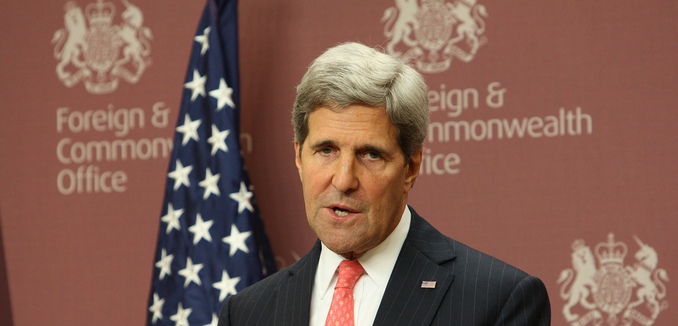Leading Syrian opposition figures have accused Secretary of State John Kerry of threatening to cut aid to forces fighting dictator Bashar al-Assad unless they agreed to attend peace talks on terms dictated by Assad’s backers, Iran and Russia.
Mohamad Alloush, a member of the Syrian opposition’s High Negotiating Committee (HNC), told Reuters Monday that his group had insisted that they would not participate in negotiations until the Assad regime lifted sieges, stopped bombing civilians, and released prisoners. All these conditions were mentioned last month in United Nations Security Council resolutions. But when Kerry met with HNC leaders on Saturday night, Alloush said, he attempted to “pressure us to forgo our humanitarian rights … and to go to negotiate for them.”
“Kerry said it in the context that if they don’t go, it will affect their public image and this may affect the aid they receive from their friends,” Hadi al-Bahra, the former president of the Syrian National Coalition, told Bloomberg News. “It was more speculation than a direct warning, but people understood this as a threat.”
Business Insider reported Monday that Kerry also admitted that the U.S. was no longer insisting that Assad leave power:
According to translations provided by multiple Middle East analysts on Twitter, Kerry told the opposition delegation that, based on an “understanding” he had reached with Russian Foreign Minister Sergei Lavrov, Assad has the right to run for re-election and there will be no set timetable for his departure.
That stands in contrast to the White House’s previous position that while Assad does not have to go immediately, the timing of his departure should be addressed during negotiations.
Business Insider also reported that Kerry endorsed a four-point peace plan that has been formulated by Iran, Assad’s chief sponsor. The plan calls for a ceasefire that would apply to all groups except for ISIS and the al-Qaeda affiliate Jabhat al-Nusra. This, Business Insider noted, “would grant legitimacy and ‘an official status’ to the Shiite militias Iran has built in Syria to support Assad.”
Tony Badran, a research fellow at the Foundation for Defense of Democracies, reported on Twitter that Kerry had said that insisting that Assad abide by UN Security Council resolutions would be “unacceptable ‘preconditions.'” Ambassador Robert Ford, the last American ambassador to Syria, responded, “If Kerry did say such, then no US Govt credibility after voting 4 UN Secuty Council resolutions 2118, 2139 and 2254.”
“US officials are telling Syrians what extremists have been telling them for years: the US isn’t your friend,” Hassan Hassan, author of ISIS: Inside the Army of Terror and a resident fellow at the Tahrir Institute for Middle East Policy, said in a series of tweets analyzing the news. “With the way things have stacked up, it’s hard not to see it as Obama and Kerry consciously working for the defeat of #Syria’s opposition,” tweeted Kyle Orton, an associate fellow at The Henry Jackson Society, a British think tank.
News of the pressure on Syrian opposition groups to submit to an Iranian-backed peace plan comes just days after Buzzfeed reported that a UN report on humanitarian aid in Syria deleted references to the devastating siege of Madaya by the Syrian army and Hezbollah after “consultation with the Assad regime.”
Although the Obama administration had previously stated that Assad must be removed from power, The New York Times reported a year ago that the United States had indicated that despite its support of the rebels, it was not explicitly targeting Assad. In the wake of the nuclear deal with Iran last summer, the Times reported that the administration hoped that the deal would increase cooperation with the Islamic Republic.
The peace talks were supposed to begin Monday in Geneva; they have now been delayed to Friday.
[Photo: Foreign and Commonwealth Office / Flickr ]




